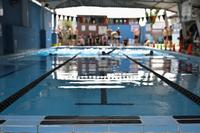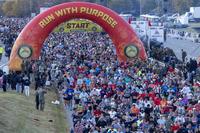Emails sometimes come in with really thought-provoking questions. This one is from a young man who likely is overwhelmed with the training options in front of him as he prepares for his future in special ops.
“Stew, I am in the process of preparing for a job in my future in either Army Special Forces or Air Force PJ. I really want to be a combat medic in the special-ops world. My question is: Do you think the programs available online and in bookstores (your included) can make a special operator OR are special operators born? What I mean is, can a program really get me through the challenges of long days and nights of being uncomfortable, borderline overtraining and thoughts of quitting?” Jake
Jake, that is one of the toughest questions I have been asked. Good one. I have a couple of stories for you to make my point, but to be brief with an answer, I think spec-ops guys are born special. They are not made by reading a book or through a fitness program. They are made by a lifetime of work ethic over talent, failing but never quitting and coming back stronger. The question is: How do you react to failure? Do you accept it and quit? Do you get better the next time around when tasked?
The lionhearted who breaks. Many spec-ops dreams have been broken for the lionhearted because of severe injuries or not meeting a standard by failing to prepare adequately. This person never would have quit, but he created serious injuries during selection (failing to prepare properly) or -- through no fault of his own -- just an accident.
He just broke or got severely ill and had to be dropped from training. You also could classify the lionhearted guy who fails academic or tactical skills tests under stress. The learning curve is steep, and sometimes it can be overwhelming.
The surprise of the class. However, I also have seen non-athletic, underprepared people somehow make it through tough, grueling training days -- day after day -- and survive on pure guts and will. They had something special in them. The why and want to of this guy were bigger than anything the selection program could throw at them.
These guys may not look like much, but they score above average on fitness tests. They pass the standards -- sometimes just barely -- and gut out every long day like it does not even phase them.
Super athletes who fail. I also have seen guys who are the highest caliber of athlete and could crush any event at BUD/S (for instance) and did not make it when the days turned into night and the water got cold and dark. No matter what collegiate, Olympic or even professional sport at which this guy excelled, there was an underlying weakness that was discovered in the first week of special-ops selection.
You have to prepare your body for the marathon of training ahead of you. These programs come in handy for that. However, you also must be prepared mentally for failure and come back stronger.
Be prepared mentally for negative feedback and physically for performing at the highest levels in your life. Not only will you be tasked with physical challenges no matter your choice (Army Special Forces or AF parajumper), you will be asked to perform a combat skill at the highest level on top of that.
Being a solid, durable tactical athlete will help enable you to handle the physical and mental stresses of selection training and advanced combat trauma care. The first goal is to discover your weaknesses. No matter your athletic history, you likely have a tactical fitness weakness.
Reread your email to me. You see where you said, “I really want to be a combat medic in the special-ops world”? I think you answered your own question. If you “really want to be a combat medic in the spec-ops world,” then get to work. Yes, going in at a high level of fitness will help you be more physically resilient and give you some confidence that you may need some days, but there are intangibles that you need to take with you.
Related reading:
- 5 Phases of Mental Toughness
- Motivation Evolves to Discipline
- The Special Ops Journey
- When to Join the Military – Ready to Serve
Stew Smith is a former Navy SEAL and fitness author certified as a Strength and Conditioning Specialist (CSCS) with the National Strength and Conditioning Association. Visit his Fitness eBook store if you’re looking to start a workout program to create a healthy lifestyle. Send your fitness questions to stew@stewsmith.com.
Want to Learn More About Military Life?
Whether you're thinking of joining the military, looking for fitness and basic training tips, or keeping up with military life and benefits, Military.com has you covered. Subscribe to Military.com to have military news, updates and resources delivered directly to your inbox.
















